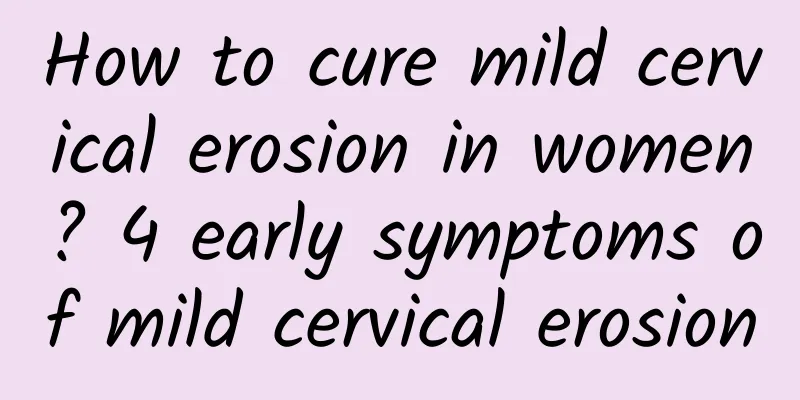Will the treatment time of pelvic inflammatory disease affect menstruation?

|
Will the treatment time of pelvic inflammatory disease affect menstruation? The typical symptoms of pelvic inflammatory disease are lower abdominal pain, which is generally persistent and worsens after female activity or sexual intercourse. Female vaginal discharge increases and also emits a very unpleasant odor, and vaginal bleeding is abnormal, such as bleeding during or during sexual intercourse. Severely ill patients may experience systemic symptoms such as high fever, headache, and loss of appetite. Once these symptoms occur, patients need timely treatment to avoid other complications later. How long does it take to treat pelvic inflammatory disease? Patients mainly use antibiotics to treat pelvic inflammatory disease, but surgical treatment can be used when necessary. Among them, patients need to pay attention to antibiotic treatment, which must be sufficient in quantity and sufficient for the course of treatment. If the patient has acute pelvic inflammatory disease, antibiotic treatment will take at least 14 days. Some patients may take the medicine for 3 to 5 days, and then stop taking the medicine after the lower abdominal pain is relieved. In fact, for patients with acute pelvic inflammatory disease, in order to completely treat it, they must take a sufficient course of treatment to control the inflammation and completely eliminate the inflammation. Otherwise, it is easy to recur in the later stage and turn into chronic pelvic inflammatory disease, which may cause other complications later. Does pelvic inflammatory disease affect menstruation? Patients with pelvic inflammation not only have abdominal pain, but also have a certain impact on menstruation. Pelvic inflammation is mainly due to the serious pelvic organs of patients, including ovaries, fallopian tubes and uterus. Once inflammation occurs, it will have a certain impact on menstruation. If there is inflammation during menstruation, pelvic congestion will be severe, menstrual volume may increase, and lower abdominal pain will be more obvious. If the patient does not have inflammation during menstruation, it will cause inflammation of the pelvic organs, especially inflammation of the ovaries or fallopian tubes. Ovarian inflammation may affect ovarian function. The ovaries can secrete hormones to regulate menstruation. |
<<: What are the symptoms of irregular menstruation
>>: Prevention and care of pelvic inflammatory disease
Recommend
The most common manifestations of vulvar leukoplakia
Among many gynecological diseases, vulvar leukopl...
Is a 2.0 cm ovarian cyst serious?
Is a 2.0cm ovarian cyst serious? An ovarian cyst ...
To lose weight, dehumidify your body first! Should you choose white yam to strengthen your spleen? Purple yam?
Are you overweight and can’t lose weight? Replace...
Sports fanatic! Running a marathon with less than 10% body fat, the secret is…
The media once reported that female artist Chen Y...
Can medication cure cervical adhesions or intrauterine adhesions?
Can medication cure cervical adhesions or intraut...
What are the symptoms of uterine fibroids during pregnancy? Is the incidence of uterine fibroids during pregnancy high?
What are the symptoms of uterine fibroids during ...
What are the causes of cervical precancerous lesions?
Everyone must have a correct understanding of the...
Acupuncture treatment for premature ovarian failure
Can premature ovarian failure be treated with acu...
What are the necessary inspection items before painless abortion?
Women who have unexpected pregnancies will choose...
The harmful effects of adnexitis on women
Gynecological diseases are very harmful to the hu...
How big is the uterine fibroid in women?
How big a female uterine fibroid needs surgical t...
The causes of multiple uterine fibroids. Will multiple uterine fibroids become malignant?
Uterine fibroids are common benign tumors in the ...
Is vaginitis a sexually transmitted disease? Can vaginitis be transmitted through sexual intercourse?
Common vaginitis is not a sexually transmitted di...
Symptoms of acute pelvic inflammatory disease that women should pay attention to
Female pelvic inflammatory disease is divided int...
Which hospital is good for endometrial thickening
Clinically, there are many treatment measures for...









